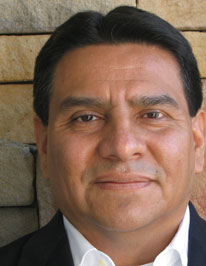
Marco Celada has been bouncing between Colorado and Guatemala for years, first as an exchange student, then fleeing a brutal civil war and now as director of a new medical facility operated by the Colorado School of Public Health.
“I love being there on the ground and making a difference,” said Celada. “But it’s a huge challenge with a lot of moving parts.”
The Center for Human Development, scheduled to open March 14, will be the university’s first, permanent overseas medical facility. It’s a highly ambitious undertaking, one moving faster than many ever expected.
Less than two years ago, the university received a $1 million donation from Gustavo and Fernando Bolaños, owners of AgroAmérica, one of the largest fruit producers in the world. The two brothers set aside 10-acres of land on their banana plantation in impoverished southwest Guatemala for a facility housing a clinic, conference center, living quarters and research lab. The goal is to provide care for the 3,000 plantation workers and the 23,000 residents of the surrounding villages.
The hot, humid region suffers from all of the manifestations of poverty - high maternal mortality, malnutrition, diarrhea, infectious disease and poor education. Doctors are scarce, and specialists largely non-existent. Locally trained health workers or `tecnicas,’ provide much of the care but it’s often very basic.
Once the center is operational, health care professionals and students from the CU School of Medicine will rotate through to treat patients and set up programs to improve health and prevent disease.
And Celada’s rather daunting task is coordinating it all.
I think I fit the job perfectly,” he said. “I’m from the area and have connections throughout the medical community in Guatemala.”
Born in Guatemala City, Celada moved to Coatepeque , a city near the new clinic, when he was a boy. His father was a doctor with a strong sense of social justice at a time when the government was waging war against leftist guerillas and anyone perceived to be their allies.
“My father was sympathetic to the left,” Celada said. “One of his friends was gunned down in Coatepeque. It came to a point where he felt the violence was getting too close so we moved to Colorado.”
Celada was already familiar with Colorado since he and his twin brother had been exchange students here, attending St. Rose of Lima Academy in Denver.
But this time the family was heading south to tiny La Jara in the San Luis Valley where a doctor shortage made it easier for his father to find work.
Celada did well academically and went on to study engineering at the Colorado School of Mines before returning to Guatemala for medical school at Francisco Marroquin University.
“I became a general practitioner and did a lot of volunteer work, including helping to build a hospital in the Petén region of Guatemala,” he said.
Celada once again returned to Colorado where he was as a patient navigator at Denver Health while working toward an MA in nonprofit management at Regis University. When he heard about the position in Guatemala he jumped at the chance.
“I was intimidated by the size of the job but I saw a lot of potential and the opportunity to make the best use of my medical and nonprofit management background,” Celada said.
The results were immediate.
“There was an instant connection between Marco and the community,” said Stephen Berman, MD, director of the Center for Global Health at the Colorado School of Public Health. “Suddenly things started happening and barriers were falling. Marco is not just Guatemalan, he’s also local. People there have a point of contact on the ground. His job is making sure all these moving parts function seamlessly.”
Edwin Asturias, MD, director for Latin America at the Center for Global Health and head of the Guatemala Project, said global health is meant to engage people living in these places.
“The goal is to do what’s best for their communities,” he said. “We want to help them transform their land and their future.”
Such transformations don’t come easily.
Every day Celada is navigating some unwieldy bureaucracy – government, university, nonprofit - to turn this idea into a reality.
He’s helped shepherd ships full of medical supplies from the U.S. to Guatemala and then to the remote clinic. He is a liaison between the hard-charging Bolaños brothers and the often slow moving university. And he’s trying to staff the facility with CU and local medical personnel so it can start seeing patients as soon as possible.
At the same time, he makes house visits to children who need more care than local health workers can offer. Once the clinic opens, Celada will supervise health care providers arriving from the U.S.
The job has been difficult personally. Celada has yet to persuade his wife to move to Guatemala so they must deal with long separations. He now spends two months in Guatemala and one month back home.
Despite these challenges, Celada believes the Center for Human Development has the power to dramatically transform a region while helping train CU faculty and a new generation of students increasingly hungry for hands-on opportunities in global health.
“This is a work in progress,” he said. “If it succeeds as we hope, it may be a pilot for similar projects throughout the world.”
